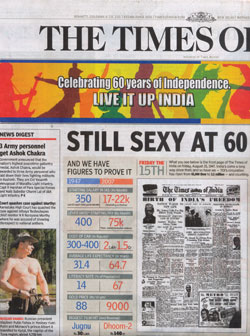 The India that emerged from the wreckage of the British Raj is the world's largest democracy, poised after years of rapid economic growth to take its place as one of the giants of the twenty-first century.
The India that emerged from the wreckage of the British Raj is the world's largest democracy, poised after years of rapid economic growth to take its place as one of the giants of the twenty-first century.
A country whose very survival seemed in doubt at its founding offers striking lessons in constructing, against all odds, a working democracy.
No other country embraces such an extraordinary profusion of ethnic groups, mutually incomprehensible languages, religions, and cultural practices, as well as variations of topography, climate, and levels of economic development.
In 1947, India's leaders faced a country with a million dead, 13 million displaced, billions of rupees worth of property damage, and the wounds of sectarian violence still bleeding.
But India made a strength out of its major weakness. Instead of suppressing its diversity in the name of national unity, India acknowledged its pluralism in its institutional arrangements: all groups, faiths, tastes, and ideologies survive and contend for their place in the sun.
This wasn't always easy. India suffered caste conflicts, clashes over the rights of different linguistic groups, religious riots, and separatist threats. Despite many stresses and strains, India has a remained a freewheeling multi-party democracy, corrupt and inefficient, perhaps, but nonetheless flourishing.
It helped that India's founding fathers, from Mahatma Gandhi on, were convinced democrats. India's first and longest-serving prime minister, Jawaharlal Nehru, spent his political career instilling in his people the habits of democracy: disdain for dictators, respect for parliamentary procedures, and abiding faith in the constitutional system.
For example, on the one occasion that he publicly criticised a judge, he apologised the next day and wrote an abject letter to India's Chief Justice.
Though there was no serious challenger to his authority, Nehru never forgot that he derived his power from India's people, to whom he remained astonishingly accessible.
By his personal example, democratic values became so entrenched that when his own daughter, Indira Gandhi, suspended India's freedoms in 1975 with a 21-month State of Emergency, she felt compelled to return to the Indian people for vindication. Having imbibed the most important of her father's values, she held a free election, which she overwhelmingly lost.
Though Indian politics is hardly immune to the appeal of sectarianism, its people have come to accept the idea of India as one land embracing many differences of caste, creed, color, culture, cuisine, conviction, costume, and custom, yet still rallying around a democratic consensus. The heart of that consensus is the simple principle that you don't need to agree all the time, except on the ground rules about how you can disagree. India has survived all the challenges that have beset it for 60 years because it has maintained a consensus on how to manage without consensus.
For example, India permits all religions to flourish while ensuring that none is privileged by the state. This includes the granting of group rights, under which Muslims are governed by their own Personal Law, distinct from the common civil code. If America is a melting-pot, then India is a thali. Each tastes different, and does not necessarily mix with the next, but all belong on the same plate.
Democracy in India is not an elite preoccupation, but matters most to the underprivileged masses. As a result, the explosive potential of caste division also has been channeled through the ballot box, with the lowest of the low attaining high office. Mayawati, a dalit woman, has ruled India's most populous state, Uttar Pradesh, as chief minister three times, and now enjoys a secure majority.
More generally, the logic of the electoral marketplace means that no single communal identity can dominate others.
Democracy has sustained an India that safeguards the common space available to each identity. That idea has knit together a country that many thought would not survive, and whose 60th birthday is therefore well worth celebrating.
Shashi Tharoor is a former Under Secretary General of the United Nations.


